THE INIMITABLE STYLE OF GLORIA MIZZI - MaltaRightNow.com
THE INIMITABLE STYLE OF GLORIA MIZZI - MaltaRightNow.com
THE INIMITABLE STYLE OF GLORIA MIZZI - MaltaRightNow.com
Create successful ePaper yourself
Turn your PDF publications into a flip-book with our unique Google optimized e-Paper software.
| EU |<br />
WILL <strong>THE</strong> EURO<br />
CAUSE PRICES<br />
TO RISE<br />
Much is being said about<br />
the country’s prospects of<br />
joining the euro zone in<br />
January 2008. Concerns<br />
have also been voiced<br />
by the public regarding<br />
the linkage between<br />
the adoption of the euro<br />
and an increase in the<br />
inflation rate as a result of<br />
increased prices during the<br />
changeover.<br />
Article written by<br />
Claire Azzopardi,<br />
Information Officer, NECC<br />
The National Euro Changeover Committee<br />
has been entrusted with the task of<br />
managing the changeover. An inherent<br />
aspect of its role is the dissemination<br />
of information and education about the<br />
practical changeover issues.<br />
Eurostat statistics have shown clearly that<br />
the adoption of the euro in 2002 resulted<br />
in an increase of 0.1% to 0.3% in the<br />
infl ation rate of the euro entrants at that<br />
time. This minimal rise in infl ation as a direct<br />
consequence of the change to the single<br />
currency did not however match citizen’s<br />
perceptions of infl ation.<br />
Studies and research done by various<br />
institutions show that immediately following<br />
the introduction of the euro, consumers’<br />
perception of the rate of infl ation was almost<br />
double that of the actual rate. This is a rather<br />
interesting but unfortunate discrepancy.<br />
Research also shows that there were<br />
extensive country differences with countries<br />
adopting stricter price monitoring and<br />
consumer confi dence mechanisms faring<br />
much better than those opting for a more selfregulatory<br />
approach.<br />
However, the question remains as to why<br />
there was such a difference between the<br />
perceived and actual rate of infl ation. One of<br />
the main reasons exposed by research was<br />
that citizens experienced price increases<br />
in certain goods and services that are<br />
purchased on a daily basis, like, for example,<br />
confectionery, bread, eggs, cigarettes and<br />
newspapers and when eating out in cafes.<br />
Since these items are bought regularly,<br />
people believed there were widespread price<br />
increases with the introduction of the euro.<br />
The facts remain, however, that the<br />
introduction of the euro did not affect greatly<br />
the infl ation basket as it is measured by the<br />
Housing Index of Consumer Prices, which is a<br />
harmonised index of prices used consistently<br />
across Europe. There is also no reason to<br />
believe that a change in<br />
currency should cause higher prices.<br />
If a nation is <strong>com</strong>mitted to price transparency<br />
and increasing <strong>com</strong>petition, lower prices<br />
should be sustained. The change is in the<br />
currency to be used, and not in the prices of<br />
goods and services.<br />
The NECC intends to utilise a number of<br />
tools that have been found to have worked<br />
well in the previous changeovers, to ensure<br />
that the introduction of the euro does not<br />
cause prices to rise. The experience of the<br />
fi rst wave member states during the transition<br />
period has shown that, amongst others, the<br />
mandatory dual display of prices is the most<br />
effective and effi cient way of ensuring price<br />
stability.<br />
The NECC will also be managing the<br />
voluntary dual display through the Fair-pricing<br />
in Retailing Initiative (FAIR). This voluntary<br />
scheme encourages entities to opt for dual<br />
display during the fi rst six months of the<br />
<strong>com</strong>ing year to <strong>com</strong>mit themselves to fair<br />
pricing during the changeover period. FAIR is<br />
therefore a perfect opportunity to demonstrate<br />
a businesses’ <strong>com</strong>mitment to transparent<br />
pricing and will result in a boost to consumer<br />
confi dence and increased <strong>com</strong>petitiveness<br />
during this voluntary phase.<br />
The NECC is determined to ensure that all<br />
sectors of society receive correct information<br />
and to plan a smooth changeover for<br />
all. Malta has the opportunity of learning<br />
from the best practices of those who have<br />
already undergone the changeover. Further<br />
assistance and information can be obtained<br />
through our Linja Ewro 154, or by visiting our<br />
website on www.euro.gov.mt .<br />
14 L&S | SEPTEMBER ’06



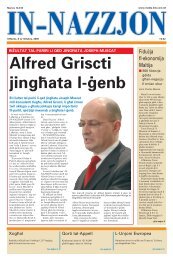
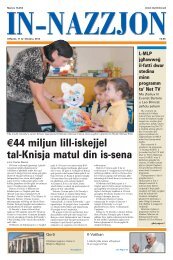
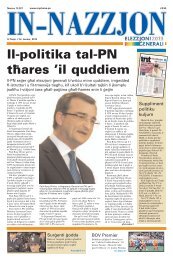
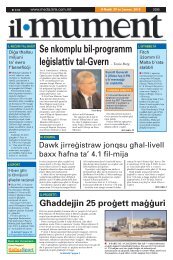
![Sandro Chetcuti akku]at b'attentat ta' qtil - MaltaRightNow.com](https://img.yumpu.com/50098970/1/174x260/sandro-chetcuti-akkuat-battentat-ta-qtil-maltarightnowcom.jpg?quality=85)


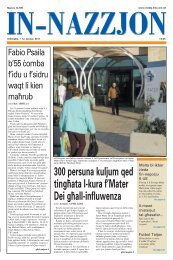
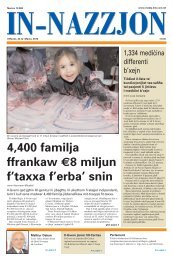

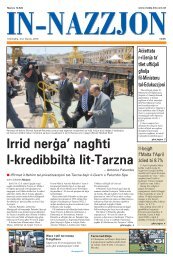
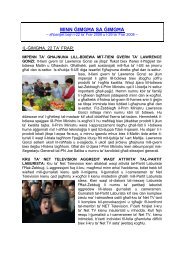
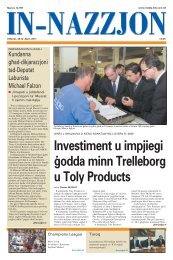
![Malta tibqa' ]]omm mal-po]izzjoni li ddikjarat fis-summit](https://img.yumpu.com/44301444/1/174x260/malta-tibqa-omm-mal-poizzjoni-li-ddikjarat-fis-summit.jpg?quality=85)
